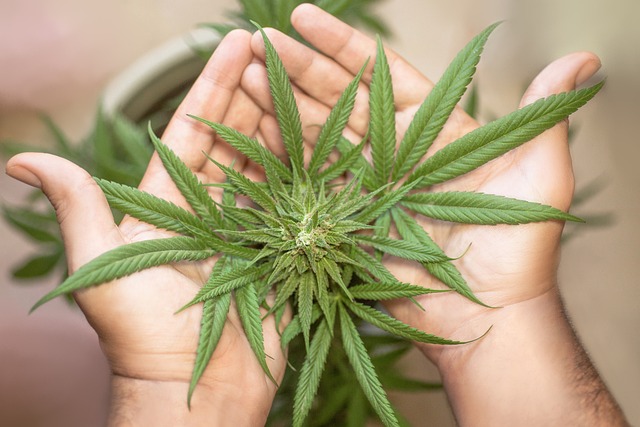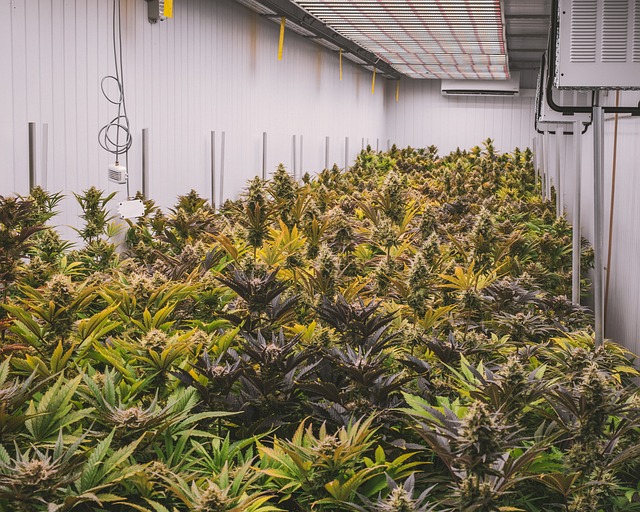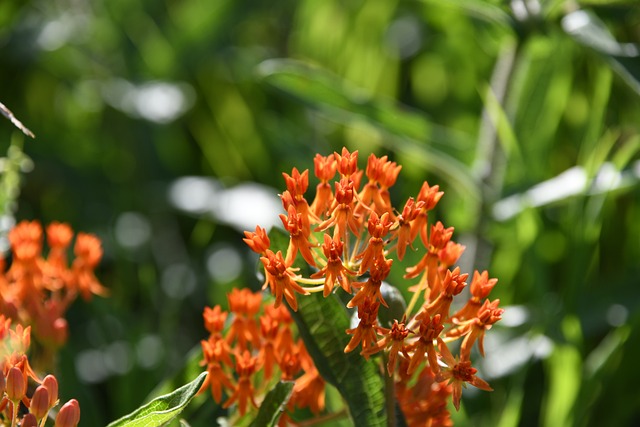THCA (tetrahydrocannabinolic acid), a non-psychoactive cannabinoid derived from the Cannabis sativa plant, has become a focus for wellness enthusiasts due to its potential health benefits and legal status in New York. The 2018 Farm Bill and subsequent New York State legislation have made hemp-derived THCA products with less than 0.3% THC legally permissible within the state, highlighting its growing importance in the wellness sector. Evidence suggests that THCA may offer therapeutic effects such as anti-inflammatory and analgesic properties, promoting joint and muscle health while providing relaxation without psychoactive side effects. Its legal standing, particularly in New York, allows consumers to explore these benefits legally, with caution to adhere to both federal and state regulations regarding THC content. As research continues, the potential of THCA as a wellness aid, with its unique properties distinct from CBD and delta-9-THC, is becoming increasingly recognized and explored within legal frameworks. Users are encouraged to consult healthcare professionals when incorporating THCA flower into their health regimens for optimal results.
Explore the burgeoning world of cannabinoids with an in-depth examination of THCA flower, a naturally occurring form of raw cannabis that’s gaining attention for its potential health benefits and unique status under New York law. This article delves into the science behind THCA, its distinct properties compared to other cannabinoids, and how it fits into the legal landscape of New York. From its anti-inflammatory and neuroprotective properties to its role in skincare and its potential impact on mental health and athletic performance, we’ll cover the myriad ways THCA flower can be integrated into a wellness routine. Whether you’re a curious consumer or a cultivator looking to comply with state regulations, this guide provides valuable insights into sourcing, dosing, and the entourage effect of full-spectrum products. Join us as we navigate the transformative potential of THCA flower within the realms of health, wellness, and legal compliance.
- Unveiling THCA Flower: A Closer Look at Its Rising Popularity
- THCA Flower and the Law: Understanding Its Legal Status in New York
- The Science Behind THCA: Potential Benefits and Effects
- How THCA Flower Differs from Other Cannabinoids
- THCA Flower for Wellness: A Comprehensive Guide to Its Uses
Unveiling THCA Flower: A Closer Look at Its Rising Popularity

Unveiling THCA Flower, a natural compound found in the Cannabis sativa plant, has garnered significant attention for its potential wellness benefits and rising popularity. THCA, or Tetrahydrocannabinolic Acid, is the raw form of THC, the psychoactive component of cannabis that is often heated to convert it into THC in products like marijuana and hashish. However, THCA itself has not been legalized at the federal level in the United States; its legality varies by state. In New York, for instance, THCA-rich hemp products are within the bounds of the law under the 2018 Farm Bill and the New York State Industrial Hemp Pilot Program, provided they contain less than 0.3% THC on a dry weight basis.
The interest in THCA Flower stems from its unique properties. Unlike its heated counterpart, THC, THCA is non-psychoactive, offering the potential benefits of cannabinoids without the ‘high.’ Advocates claim that THCA may support joint and muscle health, promote relaxation, and help maintain overall wellness, although more research is needed to substantiate these claims. Users often consume THCA Flower by inhaling vaporized or smoked flower, though it can also be found in edibles, capsules, and topical applications. As such, the growing interest in THCA’s potential benefits has led many consumers to explore THCA Flower as a legal alternative to traditional cannabis products in states like New York, where its use aligns with state regulations.
THCA Flower and the Law: Understanding Its Legal Status in New York

In recent years, the conversation around cannabinoids has expanded to include tetrahydrocannabinolic acid (THCA), which is the raw, non-psychoactive form of THC found in hemp and cannabis plants. As regulations evolve, understanding the legal status of THCA-rich products becomes paramount for consumers and businesses alike. In New York, the legal landscape has undergone significant changes with the passing of the 2018 Farm Bill at the federal level and the Compassionate Care Act (CCA) at the state level. Under the 2018 Farm Bill, hemp-derived products containing less than 0.3% THC were legalized nationwide, including in New York. This has opened doors for the use of THCA flower, provided it adheres to the THC concentration limit. Additionally, New York’s own CCA, although focused on cannabis derivatives for medical purposes, has paved the way for a broader conversation about cannabis compounds and their potential health benefits, further clarifying the legality of THCA-rich hemp products. It’s important for consumers in New York to stay informed about local regulations as they can vary from federal laws; for instance, state regulations may differ on the sale and possession of hemp-derived products with higher THC concentrations, which could potentially include THCA flowers. Navigating these legal distinctions is crucial for anyone interested in incorporating THCA flower into their wellness routine within the bounds of New York law.
The Science Behind THCA: Potential Benefits and Effects

Delta-9-tetrahydrocannabinol acid (THCA) is a non-psychoactive compound found in the Cannabis sativa plant that has garnered attention for its potential therapeutic properties. As of my knowledge cutoff in 2023, THCA is legal in New York under state law for medical use, with certain limitations. Scientific research suggests that THCA may offer a range of health benefits due to its interaction with the body’s endocannabinoid system. Preclinical studies indicate that THCA possesses anti-inflammatory and neuroprotective effects, which could be beneficial in managing conditions like arthritis and neurodegenerative diseases. Additionally, THCA is believed to exhibit analgesic properties, making it a potential alternative for pain management without the psychoactive effects associated with delta-9-THC.
In laboratory settings, THCA has shown promising results in reducing nausea and stimulating appetite, attributes that are particularly relevant for patients undergoing chemotherapy or those suffering from wasting syndromes. The compound’s anti-emetic properties are thought to arise from its ability to interact with the CB1 receptors in the brain, which play a role in regulating nausea and vomiting. Moreover, THCA’s potential as an anti-cancer agent is an area of burgeoning interest, with studies suggesting it may inhibit the growth of certain cancer cells. As research continues to evolve, the full spectrum of THCA’s benefits and effects becomes clearer, offering hope for a range of therapeutic applications, especially within the legal framework established by states like New York.
How THCA Flower Differs from Other Cannabinoids

The therapeutic properties of the cannabis plant are attributed to its diverse range of compounds, with tetrahydrocannabinolic acid (THCA) being one of its most prominent cannabinoids. Unlike its well-known counterpart delta-9-tetrahydrocannabinol (delta-9-THC), THCA is non-psychoactive, meaning it does not induce the ‘high’ commonly associated with cannabis use. This distinguishing feature makes THCA an appealing option for individuals seeking the potential therapeutic effects without psychoactive impairment. In states where cannabis has been legalized, such as New York with its adult-use program that includes THCA as part of the legal landscape, consumers have access to products containing this cannabinoid in its raw flower form. The legal status of THCA flowers in New York allows for research and exploration into their potential benefits, which include anti-inflammatory, analgesic, and neuroprotective properties. These benefits are attributed to the way THCA interacts with the body’s endocannabinoid system, offering a unique set of effects that differentiate it from other cannabinoids like CBD (cannabidiol) and delta-9-THC. As such, THCA flowers are increasingly being recognized for their potential in various wellness routines and health conditions, with ongoing scientific investigation further illuminating their role within the broader cannabis community.
THCA Flower for Wellness: A Comprehensive Guide to Its Uses

THCA, or tetrahydrocannabinolic acid, is a natural compound found in the cannabis plant that has garnered attention for its potential wellness benefits. Unlike its more famous counterpart, THC (tetrahydrocannabinol), THCA is non-psychoactive, offering wellness advantages without the high traditionally associated with cannabis consumption. As of recent legislation updates, THCA-rich hemp flowers are recognized as legal in New York, provided they contain less than 0.3% delta-9-THC on a dry weight basis, opening up a new realm of wellness options for residents.
The benefits of THCA flower are multifaceted and have been the subject of ongoing research. Proponents claim that it may support joint and muscle health due to its anti-inflammatory properties. Additionally, some users report that THCA helps in maintaining a state of calm and focus, potentially beneficial for those seeking natural alternatives to manage daily stressors. The legality of THCA flowers in New York is clear under the 2018 Farm Bill and subsequent state regulations, allowing consumers to explore this cannabinoid’s potential without legal concerns. Whether used for its wellness properties or as a part of a holistic health regimen, the emergence of THCA flower as a legal product in New York marks an exciting development in the world of cannabis wellness. Users interested in incorporating THCA flower into their wellness routine are encouraged to consult with healthcare professionals and adhere to dosing recommendations to ensure a safe experience.
In recent times, THCA flower has garnered significant attention within wellness circles and as a subject of scientific inquiry. The multifaceted potential benefits of THCA, its distinct characteristics differentiating it from other cannabinoids, and the growing body of research supporting its therapeutic properties have all contributed to its burgeoning popularity. As discussed, the legal landscape, particularly in New York where its status is clarified as legal under state law for medical and adult-use recreationally, has paved the way for broader access and study. It’s clear that THCA flower holds promise for those seeking alternative wellness solutions and could play a valuable role in various health and well-being practices. As research progresses, understanding its effects and benefits will undoubtedly become more nuanced, potentially leading to new applications and insights into the full scope of its potential.
